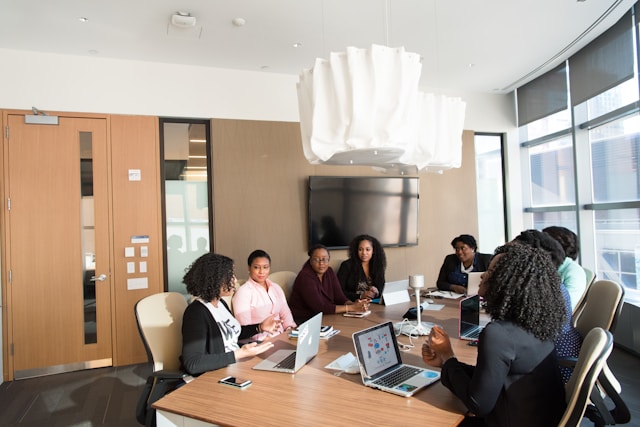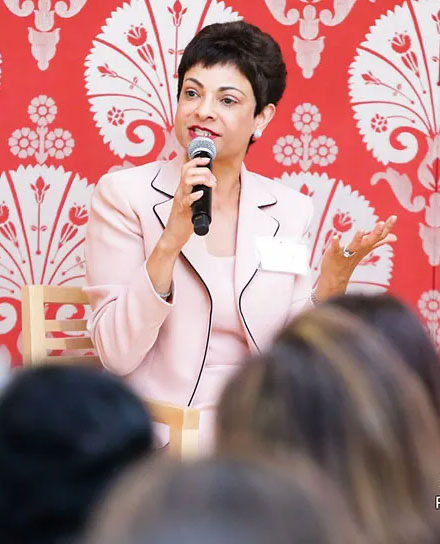Paying it Forward: Going from Poverty to Corporate Success to Giving Back

I led global teams that delivered over $1B in revenues annually and quit at the peak of my career. Here’s what I learned.
As a young girl growing up in a small town in Mwanza, Tanzania, I had no idea there was such a word as a corporate executive, let alone that I could ever be one.
My mom who has a 4th grade education, got married at the age of 14 and had her first child at the age of 15 worked to supplement my father’s meager income to raise my 3 siblings and I. It was painful to watch her work so hard cooking for others and selling food on the streets. In high school I would dream of obtaining a college degree because I was convinced it would help me lift myself and my family out of poverty.
This dream required me to leave home at the age of 15 to pursue higher education as there was no education past tenth grade in Mwanza. After getting a bachelor’s degree in mathematics from India, I realized that was not enough. I decided to get a degree in Computer Science in the United States. Upon graduation, I was offered a job by a technology start up company. My starting salary of $27,000 was more money than my parents could make in 10 years, and I was ecstatic.
I was deeply aware of how fortunate I was to have a job in the United States that paid me so much money. I went to work with a spring in my step, and I felt like I had won a lottery.
Soon I realized that I was the only woman of color in an organization of 2000 Engineers. I was also undereducatedcompared to others, underprivileged in my economicstatus, and under-proficient in the language and culture. I compared myself to other and started undermining myself, undervaluing my opinion, and underestimating my worth. This instilled fear of speaking up.
However, I also knew that the only way I would keep my dream alive of never being poor again was to becomedifficult to replace- otherwise my company would not go through the process of extending my visa. This forced me to face my fear, find my voice and contribute such unique value that they decide to extend my visa.
When the company ran out of money and shut down after 3.5 years, I had acquired skills that were in great demand and was hired by IBM.
This knowledge that I keep a job if I create enough unique value to become difficult to replace won me a highly coveted award a year after I joined IBM. As a result, I was invited to a women’s roundtable with a senior executive, Susan Whitney. I was asked by my boss to walk Susan back to his office. Casually, she asked me, where I wanted to be in 5 years.
With a glazed look in my eyes, I told her I did not know. I told her that I get so focused on doing the best possible job in my current role that I have never thought about where I want to be in 5 years. She told me it was critical to do the best possible job in my current role AND it was equally critical to think about what I wanted to do next and next. She also told me that I had so much potential.
Based on where I came from, I felt very successful making $40,000 a year and renting a one-bedroom apartment. I did not realize I was settling for small successes.
She shifted my mindset to seek growth and become more. I had more questions than answers. I was not sure what potential meant at the time. While the answers did not come right away, she planted a seed in my head that I had more potential and that I must think about what I want to do next and next.
In my journey to figure what to to do next and next, I faced many internal and external barriers- each became a platform for learning and growing. And it was not just learning from the challenges but also learning from opportunities. Each level of success unfolded more possibilities until I became one of the highest-rankingwomen of color at IBM. I have hired promoted and given pay raises to thousands of professionals. I have led global teams and delivered $1B in revenues annually. Then I quit my job…at the peak of my career.

When I reflected on my successes, I knew my mentor Susan Whitney and many others helped me along the way. They taught me the power of mentoring someone.
While I was working, I did my part as much as I could to mentor others at work and outside of work. Every-time I had an opportunity to help someone succeed, I felt like I was honoring the people that had helped me. But I also felt like it wasn’t enough.
So I left my corporate role to focus all my time and energy to help others succeed. I have mentored hundreds of women and started sharing my insights with audiences at colleges, conferences and companies.
I recognized that they were facing the same internal and external barriers that I did. They were discouraged by not seeing enough people in the room who look like them,who are relatable to their race, sex, education level, or cultural and socioeconomic backgrounds. They did not think they were capable of leading because they don’t see other women in leadership roles within and outside their companies. They were full of self-doubt and were settling for small successes.

Many women, especially single mothers, immigrant women, women of color, women from underprivileged backgrounds and first-generation college graduates told me that I gave them hope. And that feeling brought me immense satisfaction. The more women I was able to help, the more it inspired me to do more. They made me realize that all my experiences were preparing me to do this work and by sharing my insights with more women globally I have been able to advocate for gender equality in leadership roles.
There are three promises I hope you can make with me so we can collectively achieve gender parity in leadership roles but we can also lift other women by paying it forward:
1. I promise to reach back and give other women the same chances that helped me succeed.
2. I promise to intentionally use my time, talent, and treasure to uplift other women.
3. I promise to intentionally engage in discussions and decisions that pave the way to li other women.
This guest post was authored by Shelmina Bahai Abji

Shelmina Babai Abji is a former Vice President at IBM. A TEDx speaker, angel investor and board member, she is devoted to creating gender equality in leadership by helping career women emerge as leaders. She is the author of the new book, Show Your Worth: 8 Intentional Strategies for Women to Emerge as Leaders at Work. For more information, please visit, www.shelmina.com.
*******
Ms. Career Girl strives to provide valuable insights you can use. To see more from our columnists and guest authors, check these out! Or subscribe to our weekly email featuring our latest articles. We’re also present on Medium!


